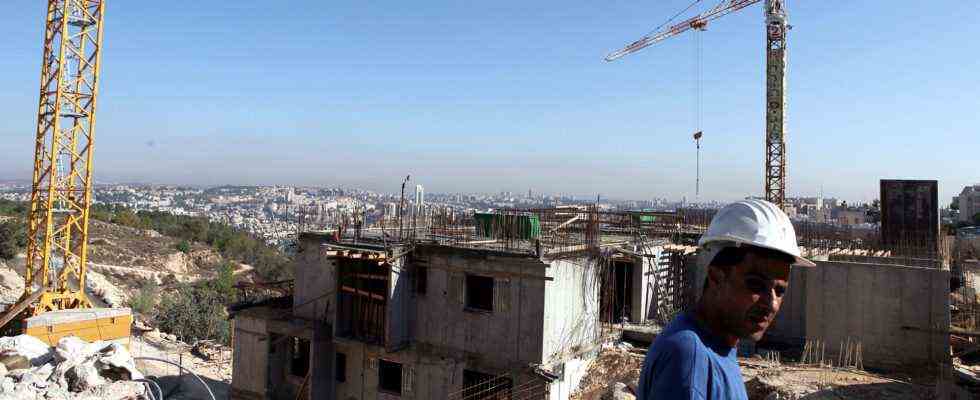report
Status: 11/15/2021 12:51 p.m.
In order to alleviate the misery in the Gaza Strip and thus improve the security situation, Israel is currently allowing more Palestinians to enter the Gaza Strip as workers. But their status is complicated.
To get a feel for the current level of tension between Israel and the Gaza Strip, a visit to the only crossing at Erez has always been a good indicator. Anyone who drives to the forecourt on the Israeli side these days will be in for a surprise.
He was ghostly orphaned during the most recent escalation in May. Israel had closed the border – as always when Hamas, which ruled Gaza, fired rockets into Israeli territory or allowed burning kites to fly over the border fence. But even in times when the guns were idle, Erez was mostly deserted. Only a few taxi drivers dozed off in the shadows or fought over the few customers. The gates rarely opened: most likely for seriously ill people, often small children with an accompanying person, on the way to East Jerusalem for treatment.
Israel and Egypt have sealed off the 40-kilometer-long and, on average, ten-kilometer-wide coastal strip from the outside world since the radical Islamic Hamas took power there in 2007. It is listed as a terrorist organization by the EU and the USA. Due to the lockdown and the corrupt mismanagement of Hamas, the economic hardship in Gaza is immense. The nearly two million inhabitants live in miserable conditions, many below the poverty line. Unemployment is more than 50 percent.
Hustle and bustle at the border crossing
The more tense the situation with Hamas, the more restrictively Israel controlled the granting of the coveted permits to leave the country. But these days there is nothing short of hustle and bustle in Erez. The taxis have been reinforced by minibuses to be able to transport the many people. And they are no longer mostly sick, but mostly strong men.
The reason: Israel has greatly increased the number of work permits for Palestinians from the Gaza Strip. A total of ten thousand such papers are now to be issued. With it, the workers on Israeli construction sites, in agriculture or in production can earn money to feed their families in Gaza. The Israeli government wants to alleviate the great pressure caused by misery and poverty – in the hope that this will have a positive impact on the security situation.
Workers are officially self-employed
30-year-old Ahmed was one of the first to come to Israel with a newly issued permit. He can hardly believe his luck. He now works just 60 kilometers from his wife and two young children who had to stay in Gaza City. But for Ahmed it’s a journey into another world. In the party metropolis Tel Aviv-Yaffa, he washes cars in an Arab workshop. He earns 300 Israeli shekels a day, the equivalent of around 85 euros.
“And imagine,” he says. “I even have this job guaranteed 20 days a month. 20 times 300 shekels, crazy!” Ahmed smiles sheepishly. It is a very large sum for him. It was a good day in Gaza if he ever had a casual job and made 50 shekels. Because Ahmed is afraid that his luck will soon be over, he doesn’t want his real name published. This applies to everyone who has received one of the coveted permits.
And for several reasons: Anyone who expresses themselves positively about Israeli employers must fear restrictions from Hamas. At the same time, the status of the Palestinians in Israel is complicated. Even if the papers are officially referred to as “work permits”, they are actually approvals as traders and business owners. This means that the Palestinian workers are officially self-employed. There are no regulations for them regarding taxes or social security contributions.
Married men only permits
In Gaza, Ahmed first had to register with the Chamber of Commerce, which cost him 200 shekels. Permits are only given to men who are at least 25 years old and married. Israel considers the risk of attracting potential terrorists to be too high for young unmarried people. Ahmed’s permit is valid for half a year and officially only for the time between 7 a.m. and 7 p.m.
That means that he should actually return to the Gaza Strip every evening – from a purely logistical point of view, far too much of a hassle. Like almost all of the new workers, he is staying in Israel. Ahmed wants to work through until his permit expires. “I miss my wife and children. But then I think about how happy they will be when I come back with all the money,” he says. “I pray that I can really stay here for the full six months without any problems.” Ahmed is very well aware that the Israeli authorities can withdraw this tolerance at any time.

